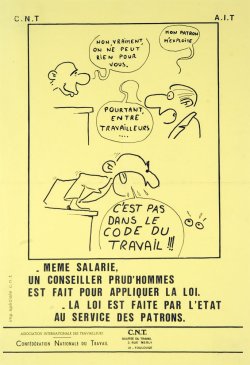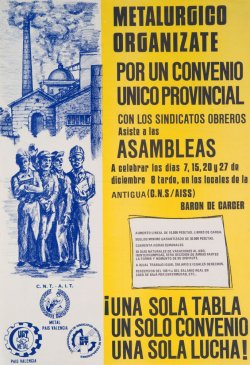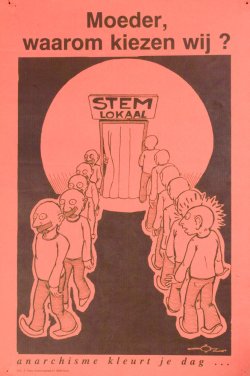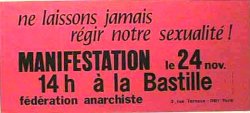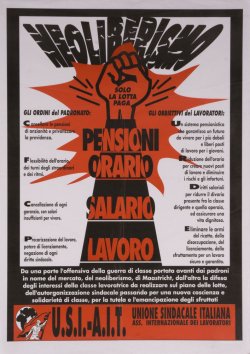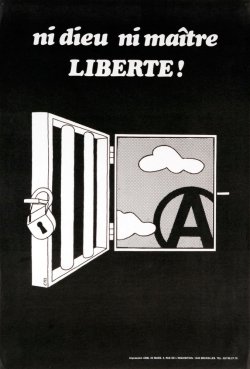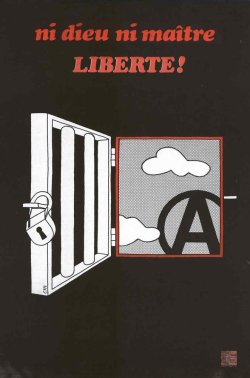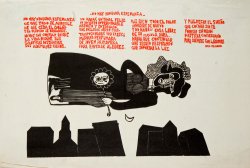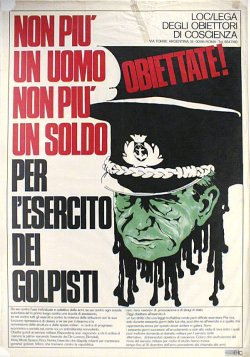noir
3358 affiches :
- notice : Image (fixe ; à 2 dimensions)
- notes :
- descriptif :
[ texte ; dessin (« encadré » de type bande dessinée) ]
- texte :
— Mon patron m’exploite
— Non, vraiment on ne peut rien pour vous.
— Pourtant entre travailleurs…
— Ce n’est pas dans le code du travail !!!— Même salarié, un conseiller prud’hommes est fait pour appliquer la loi.
— La loi est faite par l’État au service des patrons.Association internationale des travailleurs - Confédération nationale du travail
CNT, Bourse du travail - 3, rue Merly - 31, Toulouse
imp. spéciale CNT
- notice : Image (fixe ; à 2 dimensions)
- notes :
- descriptif :
[ texte sur colonne jaune ; dessin bleu sur colonne blanche (ouvriers devant une usine) ; logos (oranisations syndicales) ]
- texte :
Metalúrgico organízate
por un convenio único provincial
con los sindicatos obreros
Asiste a la
asambleas
A celebrar los días 7, 15, 20 y 27 de diciembre 8 tarde, en los locales de la Antigua (CNS-AISS)
Barón de CarcerAumento lineal de 10.000 pesetas, libres de carga.Sueldo minimo garantizado de 30... pesetas.Cuarenta horas semanales.30 días naturales de vacaciones al año, ininterrumpidas, sera decisión de ambas partes la forma y momento de su disfrute.A igual trabajo salario e iguales derechos.Percepción del 100% del salario real en caso de baja por enfermedad, etc.Una sola tabla, un solo convenio, una sola lucha !
CNT-AIT metal País Valencia — UGT metal País Valencia — CSUT
- notice : Image (fixe ; à 2 dimensions)
- notes :
- descriptif :
[ texte en défonce sur fond taillé, rouge et noir ]
- texte :
Mitin anarcosindicalista CNT-AIT
Alternativa al pueblo de Aragón
Día 8 de abril, hora 6 tarde
Lugar : campo de futbol Sto Domingo, Final c/ Doctor Iranzo
Barrio las Fuentes
Linea de autobuses : 30, 24, 22.
Zaragoza
- notice : Image (fixe ; à 2 dimensions)
- notes :
- descriptif :
[ texte et dessin (allégorie : femme antique levant couronne de laurier et drapeau) en défonce, sur fond taillé, rouge et noir ]
- texte :
Mitin confederal
1° de noviembre
CNT — AIT
- notice : Image (fixe ; à 2 dimensions)
- notes :
- descriptif :
[ texte blanc sur fond noir ]
- texte :
Mitin
Fronton Vitoriano domingo, 25 noviembre 12 horas
Contra el estatuto del trabajador
Intervendran :
Ramon Diaz (secretario general de la CNT de Asturias)
Floreal Crespo (secretario general de la CNT de Euskadi)
Santiago Abas (secretario general de la CNT de Vitoria)
preparemos la hulga general
CNT-AIT
1979 ou 1984 ou 1990 ou2001 ?
- notice : Image (fixe ; à 2 dimensions)
- notes :
- descriptif :
[ texte ; photo N&B (manifestation anti aéroport sur un pont au-dessus de la Loire) ]
- texte :
Notre-Dame-des-Landes
En cas de démarrage des travaux ou d’expulsion de la ZAD
Mobilisations
Occupations
Blocages
Plus d’infos dans votre comité local ou sur zad.nadir.org
<2018
- notice : Image (fixe ; à 2 dimensions)
- notes :
- descriptif :
[ tekst ]
- texte :
Modern revolutionary theory
“Our greatest threat comes from no foreign foe but from those at home who seek to impose the power of negative thinking.”
— Gerald Ford, June 9, 1974texts in English available at :
USA
* BERKELEY : Shakespeare & Co., 2499 Telegraph Ave. 94704
*SAN FRANCISCO : Modern Times, 3800 17th St. 94114
* P.M. Bookstore, 728 Vallejo St. 94133
CHICAGO : New Space Books, 1509 N. Halsted St., 60622
CAMBRIDGE : Redbook, 136 River St. 02139
WASHINGTON, D.C. : Community Bookshop, 2028 P St., N.W. 20036CANADA
EDMONTON : Erewhon Books, P.O. Box 2827, Station AENGLAND
LONDON : Compendium Bookstore, 240 Camden lligh St., NW1HOLLAND
*WAGENINGEN : Bas Moreel, Nobelweg 108FRANCE
*STRASBOURG : Vroutsch la Marge, 31 rue Louis Lapsgel, 67000textes en français sort en vente à :
PARIS : Kiosque "Cluny", 23 Bd. Saint-Michel 5e
Librairie La Pochette, 5 rue Mirbel 5e
Librairie Tschann, 84 Bd. Montparnasse 14e
GRENOBLE : Poisson Soluble, 30 rue Raoul Blanchard, 38000
RENNES : Le Monde en Marche, 37 rue Vasselot, 35000
*STRASBOURG : Vroutsch la Marge, 31 rue Louis Lapsgel, 67000* tambien ttenen textos en espanol
On behindism
(Shutes)"As Oliver Hardy would put it, the behindist is constantly ’overbounding his steps.’ Theory is concealed by its very excess. The totality the behindist wants to confront —precisely because he wants to confront it all at once remains inaccessible. ... Women’s behindism is also a concentrated expression of the feminine role which they are allotted by society and which they allot themselves through their own characterological complicity."
Theory of misery/misery of theory
(Denevert)
(translation : Cooperstein, Hammer & Knabb)Also includes the Declaration concerning the group "Center for Research on the Social Question"
"If the Situationists’ theory still directly interests the revolutionary movement, it is in order to draw the lesson of what it could become. ... Even if a constituted situationist theory had never existed as a possible source of inspiration, the system of commodity consumption implicitly contains its own situationism."
Double-reflection
(Knabb)• The Theorist as Subject and as Role
• Behindism, or Theory Colonization
• Flow to Win Friends and Influence History
• Affective Detournernent : Alternative to Sublimation
• Sleepers Awake"Whereas the sociologists study man as he is ’normally’- that is. reduced to survival, a sum of roles, a sum of banalities we are going to study him when he acts to suppress all that."
Reproduction of human capital
(Cooperstein)
"The family is the first factory of alienation. Even before a kid learns to talk he learns value_ The infant can not reject love if only he can be made absolutely dependent on it this is the pet syndrome (born of loneliness, children are raised as dogs)...Report #1
(Cronin)Critique of pro-situationist "counterfeitisrn"
"Each new initiate rinds that in order to participate properly he must begin where the last Counterfeit left off. This quantitative progression will, no doubt, lead him to disguise the hundredth repetition of the condensed history of workers councils as a broadcast from a martian bureaucrat."
Disinterest compounded daily
(Rosenberg & Shutes)Critique of the group "Point Blank"—second printing, with an added critique of the original edition.
"We remained the ideological pretenders to a non-existent current of agitation, while we gnashed our teeth and proclaimed how seriously we took our de-sires, we spent the last weeks of the quarter doing just what everyone else at the University did : ’jerking off for our professors.’ "
Skirmishes with an untimely man
(Cronin & Shutes)
Critique of the journal "Diversion"Now what a mid, of horseshit. ... Horelick is a proletarian cheerleader who pumps up every workers’ action in the desperate hope that an inflated consciousness of what they’ve already done will lead the workers to do more. ... We could hardly expect him to answer ur even pose the more important question : What has the proletariat nor done. why hasn’t it done more ?"
On the poverty of student life
(Situationist International)Over 400,000 copies printed in 12 languages since its first edition, in 1966, at the expense of the University of Strasbourg
"The student is a stoical slave : the more chains authority heaps upon him, the freer he is in fantasy. ... He celebrates all the values and mystification of the system, devouring them with all the anxiety of the infant at the breast. ... The student is already a very bad joke."
Remarks on contradiction and its failure
(Knabb)
On the activities and mistakes of the ex-group "Contradiction""The organization of our critique can be seen in retrospect as a continual attempt to unravel what we had ravelled in the first place. In the process we got very entangled ! ... One does not embark on such enterprises with impunity. The incompleted, the unclarified, the unresolved, the falsified accumulate with painful results. The repressed returns."
Reich : how to use
(Voyer) (translation : Knabb)"While Reich concluded in a very ambiguous manner that character was an obstacle to work, we hold that character is an obstacle to the critique of work. ... Theory knows misery as secretly public. It knows the secret publicity of misery. All hopes are permitted it. Class struggle exists."
Reich: modo de empleo
(Voyer)
(traducción: Carrion)"Mientras que Reich llegaba a considerar de una forma muy ambigua que el carácter era un obstáculo para el trabajo, nosotros sostenemos que el carácter es un impedimento a la critica del trabajo.... La teoría conoce la miseria como secretamente publica. Conoce la publicidad secreta de la miseria. Todas las esperanzas le están permitidas, La lucha de clases existe."
Déclaration à propos du Centre de Recherche sur la Question Sociale
(Bloch. Charles, Cornuault & Denevert)"Le CRQS, complément semi-organisationnel, intentionnellement limité, à nos activités respectives et distinctes de theoriciens révolutionnaires … sera automatiquement dissout quand la realité du mouvement révolutionnaire aura rendu possibles et défini des formes d’association supérieures."
Théorie de la misère/ misére de la théorie
(Denevert)"Si la theorie des Situationnistes intéresse encore le mouvement révolutionnaire directement, c’est pour tirer la leçon de ce qu’elle a pu devenir. … Le système de la consommation marchande, quand bien même une theorie situationniste constituée n’aurait jamais existée, comme source possible d’inspiration, contient implicitement son propre situationnisme."
Double-réflexion
(Knabb) (traduction : Cornuault)• Le theoricien comme sujet et comme role
• Lc derrierisme, ou b colonisation par la theorie
• Comment se faire des amis et influencer I’histoire
• Le detournement affectif : alternative à Ia sublimation
• Dormeurs éveillés"Alors que les sociologues étudient I’homme dans son comportement ’normal’ — c’est a dire réduit à la survie, une somme de rôles, de banalités — nous allons étudier l’homme Iorsqu’il agit pour supprimer tout cela."
Remarques sur le groupe Contradiction et son échec
(Knabb)
(traduction : Denevert)"L’organisation de notre critique apparait retrospectivement comme une continuelle tentative pour démêler ce que nous avons commencé par emberlificoter. Nous nous sommes vraiment englues dans ce processus ’ … On ne s’embarque pas dans de telles entreprises impunément. Les choses inachevées, les questions non-clarifiées, non-résolues ou falsifiées, s’accumulent avec lour conséquences pénibles. Ce qui est refould finit par ressurgir."
- notice : Image (fixe ; à 2 dimensions)
- notes :
- descriptif :
[ dessin (personnages clonés rentrants au "Stemlokaal" (bureau de vote) et en ressortant avec du sparadrap sur la bouche) ]
- texte :
Moeder, waarom kiezen wij ?
anarchisme kleurt je dag...
V.U. : Francis Faes, Dracenastraat 21, 9000 Gent
- notice : Image (fixe ; à 2 dimensions)
- notes :
- descriptif :
[ texte (rouge) ; dessin (noir, abstrait [visage de colon ?]) ]
- texte :
Muerte al apartheid
- notice : Image (fixe ; à 2 dimensions)
- notes :
- descriptif :
[ texte (avec effets graphiques) ]
- texte :
[sigle CGT "manos entrelazadas"] Confederación General del Trabajo
muévete por lo : que necesitas / lucha contra :
Trabajo fijo. <—> Precariedad laboral, contratos basura, Empresas de Trabajo Temporal…
Salario digno. <—> Pérdida de poder adquisitivo, horas extras ilegales y salarios miserables.
Semana laboral de 35 horas por ley. <—> Jornadas de trabajo a conveniencia de las empresas : interminables, ilegales y mal pagadas.
Jubilación a los 60 años con el 100% del salario <—> Pensiones insuficientes, fondos de pensiones que pagas tú y de los que se beneficia la banca.
Salario social. <—> Subsidios insuficientes para algunos y nada, o simple caridad, para la inmensa mayoría.
Servicios públicos suficientes y de calidad. <—> Servicios públicos escasos, caros y en vías de privatización. Mientras se recortan la Sanidad, la Enseñanza, etc., se subvencionan hospitales y colegios privados.
Decidir por ti mismo. <—> Sindicatos que pactan a tus espaldas, anteponiendo sus intereses a los de todos.
Un sindicato de clase y participativo, en el cual seas tú quién decide. <—> Sindicatos que no te informan y deciden por ti sin contar contigo.
Cambiar las cosas es necesario y es posible
participa en nuestras candidaturas
Organízate en CGT
[filigrana :] 35 horas
- notice : Image (fixe ; à 2 dimensions)
- notes :
- descriptif :
- texte :
- notice : Image (fixe ; à 2 dimensions)
- notes :
- descriptif :
[ texte (en surimpression) ; dessin (maison entourée de petits bonshommes) ]
- texte :
Nach Räumung
Demo
14 h Paradeplatz
Wenn ihr dieses Haus räumt haben wir nicht ausgeträumt. Friedengass macht Rabatz
- notice : Image (fixe ; à 2 dimensions)
- notes :
- descriptif :
[ texte ; citation de Orwell ]
- texte :
Não ao terrorismo do estado
“O objectivo da perseguição é a perseguição.
O objectivo da tortura é a tortura.
O objectivo do poder é o poder.”
1984 - George Orwell• Queres ser Espiado ?
• Fichado ?
• Queres ver as tuas conversas telefónicas escutadas e as tuas cartas abertas ?
• Eque dizes a ser preso sem provas ?Então diz não ao estado polícia !
Diz não a lei terrorista !Edição à Margem
Brésil ou Portugal ? : revue A Margem (Coimbra)
- notice : Image (fixe ; à 2 dimensions)
- notes :
- descriptif :
[ texte ]
- texte :
Ne laissons jamais régir notre sexualité !
Manifestation, le 24 nov. - 14 h à la Bastille
Fédération anarchiste - 3, rue Ternaux - 7501 Paris
- notice : Image (fixe ; à 2 dimensions)
- notes :
- descriptif :
[ texte ; dessin (main « capitalisme » suspendant les chefs de partis politiques — VKP, SAP, CP, FP, M — à ses doigts) ]
- texte :
Nej
till parlamentets sprattelgubbar
Rösta blankt
Frihetliga kommunister
- notice : Image (fixe ; à 2 dimensions)
- notes :
- descriptif :
[ poing qui frappe l’inscription « neoliberismo » (néolibéralisme), texte ]
- texte :
Neoliberismo
Solo la lotta paga
Pensioni, orario, salario, lavoro
Gli ordini del padronato : Cancellare le pensioni di anzianità e privatizzare la previdenza.
Gli obbiettivi dei lavoratori : Un sistema pensionistico che garantisca un futuro da vivere per i più deboli e liberi posti di lavoro per i giovani.Gli ordini del padronato : Flessibilità dell’orario, dei turni degli straordinari e dei ritmi.
Gli obbiettivi dei lavoratori : Riduzione dell’orario per creare nuovi posti di lavoro e diminuire i rischi e gli infortuni.Gli ordini del padronato : Cancellazione di ogni garanzia, con salari insufficienti per vivere.
Gli obbiettivi dei lavoratori : Diritti salariali per ridurre il divario presente fra la classe dirigente e quella operaia, ed assicurare una vita dignitosa.Gli ordini del padronato : Precarizzazione del lavoro, potere di licenziamento, negazione di ogni diritto sindacale.
Gli obbiettivi dei lavoratori : Eliminare le armi del ricatto, della disoccupazione, del licenziamento, dello sfruttamento per un lavoro sicuro e garantito.Da una parte l’offensiva della guerra di classe portata avanti dai padroni in nome del mercato, del neoliberismo, di Maastricht, dall’altra la difesa degli interessi della classe lavoratrice da realizzare sul piano delle lotte, dell’autorganizzazione sindacale passando per una nuova coscienza e solidarietà di classe, per la tutela e l’emancipazione degli sfruttati.
USI-AIT — Unione Sindacale Italiana - Ass. Internazionale dei Lavoratori
Affiche parue après 1992 (traité de Maastricht).
- notice : Image (fixe ; à 2 dimensions)
- notes :
- descriptif :
[ dessin (une fenêtre de cachot ouverte donnant sur un A cerclé) signé CM ; texte ]
- texte :
Ni Dieu ni maître
Liberté !
Impression ASBL 22 Mars. 2, rue de l’Inquisition. 1040 Bruxelles. Tél. 02/736.27.76
Il y a eu plusieurs versions de cette affiche.
Le visuel est repris un « Une » du Monde libertaire n° 1788(4- mai-4 juin 2017)
- notice : Image (fixe ; à 2 dimensions)
- notes :
- descriptif :
[ dessin (une fenêtre de cachot ouverte donnant sur un A cerclé) signé CM ; texte ]
- texte :
Ni Dieu ni maître
Liberté !
22 Mars […]
Il y a eu plusieurs versions de cette affiche.
Le visuel est repris un « Une » du Monde libertaire n° 1788(4- mai-4 juin 2017)
- notice : Image (fixe ; à 2 dimensions)
- notes :
- descriptif :
[ texte ; dessin (défilé avec une banderole “anarquia”) d’Azagra ]
- texte :
Ni dios ni amos
contra toda autoridad
Biblioteca social Reconstruir - av. Morelos No 45 Desp. 206 Col. Centro Tel. fax 5 512 08 86 Email : libertad@internat.com.mx
- notice : Image (fixe ; à 2 dimensions)
- notes :
- descriptif :
[ texte ; dessin (voyageur à baluchon avec pinces, devant des barbelés dont deux fils représente le sillage d’avions ; texte et dessin en dégradé ; logo (cadenas avec étoiles de l’Union européenne) par Titom ]
- texte :
Ni frontières, ni nations
Liberté de circulation !
www.c-g-a/org
[logo] CGA Coordination des groupes anarchistes
- notice : Image (fixe ; à 2 dimensions)
- notes :
- descriptif :
[ texte ; dessin (fenêtre ronde, avec barreaux, sur fond de nuages, étoiles et croissant de lune) ]
- texte :
y la luna se ve mas bella desde fuera !!!
Ni rejas
Ni fronteras
¡Presos fuera !
- notice : Image (fixe ; à 2 dimensions)
- notes :
- descriptif :
[ texte ; dessin (train ou métro sortant d’un tunnel, fossoyeur et cercueil, bouée "Titanic") ]
- texte :
No es accidente
Es especulación
La vida de un hombre vale mas de 8 pts
CNT-AIT
- notice : Image (fixe ; à 2 dimensions)
- notes :
- descriptif :
[ dessin (couple [dansant ?] étendu dans les airs, au dessus d’une ville de nuit) ; poème d’Idea Vilariño (?) ]
- texte :
No hay ninguna esperanza
no hay ninguna esperanza
de que todo se arregle
de que ceda el dolor
y el mundo se organice.
no hay que confiar en que
la vida ordene sus
caóticas instancias
sus ademanes ciegos.
no habrá un final feliz
ni un beso interminable
absorto y entragado
que preludie otros dias.
tampoco habrá una fresca
mañana perfumada
para empezar alegres.
más bien todo el dolor
invadirá de nuevo
y no habrá cosa libre
de su macula dura.
habrá que continuar
que seguir respirando
que soportar la luz
y maldecir el sueño
que cocinar sin fe
fornicar sin pasión
masticar con desgano
para siempre sin lágrimasIdea Vilariño
- notice : Image (fixe ; à 2 dimensions)
- notes :
- descriptif :
[ texte ; dessins (deux mains aux menottes brisées : « vivir libre o morir » ; francisque, en faisceau, ensanglantée ; prisonniers, dessinés par Ron Cobbb, avec le logo « Paix » sur leur uniforme, sous des barbelés) ]
- texte :
No se suprimen las consecuencias sin suprimir las causas
No se suprime el provecho con multas.
No se suprimen los accidentes de trabajo con jueces rojos.
No se suprime la violación con audiencias de lo criminal.
No se suprime el robo con la prisión.
No se lava la Sangre con Sangre
No a la pena de muerte
- notice : Image (fixe ; à 2 dimensions)
- notes :
- descriptif :
- Symbole(s) utilisé(s) : mains reliées (fora, cnt/cgt, …) — urne électorale — fond : drapeau rouge et noir ⚐/⚑
[ texte ; dessin (grand sigle "manas entrelazadas" : "vota CGT") ]
- texte :
No te cortes
Vota CGT
Un sindicato solidario y combativo
Alcoi
Echegaray, 10 bajo • 03800 Alcoi
Tel. 965 54 71 46Alicante
Conde de Soto Ameno, 50 entlo. • 03005 Alicante
Tel. 965 13 11 01Benidorm
Maravall, 7 - E, Eduficio Luz - Local 1 • 03500 Benidorm
Tel. 966 80 65 80Castellón
Cerdán de Tallada, 23 entlo. • 12004 Castellón
Tel. 964 25 06 36Gandia
Pinto Sorolla, 27 bajo • 46700 Gandia
Tel. 962 87 70 60Murcia
Plaza Camacho, 13 - 2° izq. • 30002 Murcia
Tel. 968 21 32 63Puçol
Castell de Morvedre, 12 - 1° dcha. • 46530 Puçol
Tel. 96 146 54 54Valencia
Avda. del Cid, 154 bajo • 46014 Valencia
Tel. 963 83 44 40 - 963 83 44 56tú decides
- notice : Image (fixe ; à 2 dimensions)
- notes :
- descriptif :
[ texte ; photo (portrait d’un enfant et d’un homme mâture) ]
- texte :
Gobierne donde gobiernen
tu seguirás pasando hambreNo votes a nadie
Boicot
lucha por tí
con nosotros !
CNT — AIT
por la colectivización de la tierra !!
- notice : Image (fixe ; à 2 dimensions)
- notes :
- descriptif :
[ Texte en carré sur drapeau taillé rouge et noir ]
- texte :
No votes
El comité es de la empresa, el sindicato del trabajador
¡Organizate !
CNT - AIT
- notice : Image (fixe ; à 2 dimensions)
- notes :
- descriptif :
[ texte ; dessin (homme qui hurle avec deux marionnettes femmes — une femme blonde (féministe ?) et une femme brune tête couverte (musulmane ?) — qui se disputent au bout de ses bras levés ; village — avec grue de chantier — barricadé de barbelés ; famille à la porte d’entrée accueillant sous le panneau « Bienvenue en France » ; frise de manifestant·e·s bombardant l’homme aux marionnettes) ]
- texte :
Non à la récupération raciste du féminisme
Pas besoin de chercher le sexisme ailleurs.
Y’a ce qui faut à la maison !
Nous n’aimons pas les faux débats sur “l’identité nationale”.
L’État-nation s’est construit sur l’écrasement de ses minorités dans les métropoles et l’exploitation des richesses dans les colonies.
Il a construit des hiérarchies et des catégories pour dire qui était “neutre” et reconnaître qui devait faire ses preuves et/ou en était forcément exclu-e.
L’État-nation se veut uni et homogène pour exister.
Pour ça il a besoin de désigner des ennemis qui permettent l’unité fictive du reste de la population.
L’État-nation a besoin de techniques pour construire l’identité nationale. Ça passe par le langage, le sport, les traditions inventées, l’école, l’Histoire, les lois, et tout un tas de choses qui traversent nos vies quotidiennes.Nous pensons qu’il y a urgence à ouvrir un débat sur le passé colonial et ses conséquences actuelles.
Il nous semble que les termes du débat devraient être définis par les minoritaires.des féministes contre l’islamophobie
Avant 2018
- notice : Image (fixe ; à 2 dimensions)
- notes :
- descriptif :
[ texte ; dessin (tête, verte, ensanglanté d’officier ; amiral ?) ]
- texte :
LOC / Lega degli Obiettori di Coscienza
via Torre Argentina, [18 - 00186 ?] Roma - Tel. 6547160Non più un uomo non più un soldo
per l’esercito dei golpisti
obiettate !
Se […]
[…]
ELC
- notice : Image (fixe ; à 2 dimensions)
- notes :
- descriptif :
[ texte ; photo (visage d’un vieil homme, tête entre les mains) ]
- texte :
Vuoi vivere con la testa ?
Uomo non esser sciocco !
Chi può campare d’una testa ?
Al massimo un pidocchio.
Per stare a questo mondo ci vuole gente più furba di voialtri : trucchi e imbrogli sono tanti che nessuno li sa. (B. Brecht)Non sostenere lo stato con il tuo voto, per l’azione diretta, per la rivoluzione sociale, per una società autogestita
[tampon]
i compagni anarchici- notice : Image (fixe ; à 2 dimensions)
[Même salarié, un conseiller prud’hommes est fait pour appliquer la loi]
[Même salarié, un conseiller prud’hommes est fait pour appliquer la loi]. — Toulouse : CNT_ (France), . — 1 affiche (impr. photoméc.), coul. (une : noir , papier jaune ) ; 45 × 31 cm.
sources :

[s.d.] |
[Metalúrgico, organízate por un convenio único provincial]
[Metalúrgico, organízate por un convenio único provincial]. — València Valence : CNT_ (España) : CSUT (Confederacion de sindicatos unitarios de trabajadores : 1977-1981) : UGT_ (Unión general de trabajadores) ; [et al.], . — 1 affiche (impr. photoméc.), coul. (trois : noir , bleu , jaune , papier blanc ) ; 64 × 44 cm.
sources :
[Mitin anarcosindicalista – alternativa al pueblo de Aragón. 8 de abril, Zaragoza]
[Mitin anarcosindicalista – alternativa al pueblo de Aragón. 8 de abril, Zaragoza]. — Zaragoza Saragosse : CNT_ (España), . — 1 affiche (impr. photoméc.), coul. (deux : rouge , noir , texte en défonce , papier blanc ) ; 50 × 35 cm.
sources :
[Mitin confederal, 1° de noviembre]
[Mitin confederal, 1° de noviembre]. — [S.l.] : CNT_ (España), . — 1 affiche (impr. photoméc.), coul. (deux : rouge , noir , texte en défonce , papier blanc ) ; x × y cm.
sources :
[Mitin contra el estatuto del trabajador]
[Mitin contra el estatuto del trabajador]. — Vitoria : CNT_ (España), . — 1 affiche (impr. photoméc.), coul. (une : noir , texte en défonce , papier blanc ) ; 59 × 40 cm.
sources :
[Mobilisations, occupations, blocages]
[Mobilisations, occupations, blocages]. — Notre-Dame-des-Landes : Zone à défendre (NDDL), . — 1 affiche (impr. photoméc.), coul. (deux : noir , orange , papier blanc ) ; x × y cm.
sources :

[s.d.] |
[Modern revolutionary theory]
[Modern revolutionary theory]. — [S.l.] : [s.n.], . — 1 affiche (impr. photoméc.), coul. (deux : rouge , noir , papier gris ) ; 61 × 43 cm.
sources :
[Moeder, waarom kiezen wij ?]
[Moeder, waarom kiezen wij ?]. — Gent Gand : [s.n.], . — 1 affiche (impr. photoméc.), coul. (une : noir , papier rouge ) ; 60 × 40 cm.
sources :
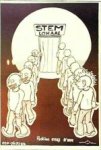
[s.d.] |

[s.d.] |
[Muerte al apartheid]
[Muerte al apartheid]. — [S.l.] : [s.n.], . — 1 affiche (impr. photoméc.), coul. (deux : rouge , noir ) ; x × y cm.
sources :
[Muévete por lo que necesitas, lucha contra... ]
[Muévete por lo que necesitas, lucha contra... ]. — [S.l.] : CGT_ (España : Confederación General del Trabajo), . — 1 affiche (impr. photoméc.), coul. (deux : rouge , noir , papier blanc ) ; 30 × 42 cm.
sources :
[Musiques au Riverbop, du 6 février au 3 mars]
[Musiques au Riverbop, du 6 février au 3 mars]. — Paris : [s.n.], . — 1 affiche (impr. photoméc.), coul. (deux : noir , jaune ) ; x × y cm.
sources :
[Nach Räumung : Demo 14 h. Paradeplatz]
[Nach Räumung : Demo 14 h. Paradeplatz]. — Zürich Zurich : [s.n.], . — 1 affiche (impr. photoméc.), coul. (deux : rouge , noir , papier blanc ) ; 30 × 42 cm.
sources :
[Não ao terrorismo do estado ; Diz não a lei terrorista !]
[Não ao terrorismo do estado ; Diz não a lei terrorista !]. — [S.l.] : a Margem, . — 1 affiche (impr. photoméc.), coul. (une : noir , papier jaune ) ; 69 × 50 cm.
sources :
[Ne laissons jamais régir notre sexualité !]
[Ne laissons jamais régir notre sexualité !]. — Paris : FA__ [2] (Fédération anarchiste : 1953-....), . — 1 affiche (impr. photoméc.), coul. (une : noir , papier de couleur ) ; x × y cm.
sources :
[Nej till parlamentets sprattelgubbar : rösta blankt]
[Nej till parlamentets sprattelgubbar : rösta blankt]. — [S.l.] : Frihetliga kommunister, . — 1 affiche (impr. photoméc.), coul. (une : noir , papier de couleur ) ; 45 × 30 cm.
sources :
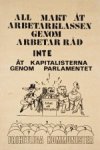
[s.d.] |
[Neoliberismo, solo la lotta paga : pensioni, orario, salario, lavoro]
[Neoliberismo, solo la lotta paga : pensioni, orario, salario, lavoro]. — [S.l.] : USI_ (Unione sindacale italiana), . — 1 affiche (impr. photoméc.), coul. (deux : rouge , noir , papier blanc ) ; 67 × 47 cm.
sources :
[Ni Dieu ni maître, liberté !]
[Ni Dieu ni maître, liberté !]. — Bruxelles = Brussels Bruxelles : éditions du 22_Mars (Bruxelles), (22_mars, impr. du (Bruxelles)). — 1 affiche (impr. photoméc.), coul. (une : noir , texte en défonce ) ; 61 × 43 cm.
sources :

[s.d.] |
[Ni Dieu ni maître, liberté !]
[Ni Dieu ni maître, liberté !]. — Bruxelles = Brussels Bruxelles : éditions du 22_Mars (Bruxelles), (22_mars, impr. du (Bruxelles)). — 1 affiche (impr. photoméc.), coul. (deux : rouge , noir , papier blanc ) ; [61 ?] × [43 ?] cm.
sources :
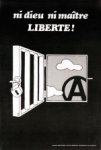
[s.d.] |
[Ni dios ni amos contra toda autoridad]
[Ni dios ni amos contra toda autoridad] / Carlos Azagra García. — México Mexico : Biblioteca social Reconstruir, . — 1 affiche (impr. photoméc.), coul. (deux : rouge , noir ) ; 57 × 42 cm.
sources :
[Ni frontières, ni nations : liberté de circulation !]
[Ni frontières, ni nations : liberté de circulation !] / Titom. — [S.l.] : CGA_ (Coordination des groupes anarchistes : 2002-2019), . — 1 affiche (impr. photoméc.), coul. (deux : rouge , noir , papier blanc ) ; [60 ?] × [40 ?] cm.
sources :

2010 |
[Ni rejas, ni fronteras ¡presos fuera !]
[Ni rejas, ni fronteras ¡presos fuera !]. — [S.l.] : [s.n.], . — 1 affiche (impr. photoméc.), coul. (une : noir , papier de couleur ) ; x × y cm.
sources :
[No es accidente, es especulacion, ea vida de un hombre vale mas de 8 pts]
[No es accidente, es especulacion, ea vida de un hombre vale mas de 8 pts]. — [S.l.] : CNT_ (España), . — 1 affiche (impr. photoméc.), coul. (deux : rouge , noir , papier de couleur ) ; 49 × 35 cm.
sources :
[No hay ninguna esperanza de que todo se arregle]
[No hay ninguna esperanza de que todo se arregle]. — [S.l.] : [s.n.], . — 1 affiche (sérigr. ), coul. (deux : rouge , noir , papier blanc ) ; 34 × 50 cm.
sources :
[No se suprimen las consecuencias sin suprimir las causas]
[No se suprimen las consecuencias sin suprimir las causas] / Ron Cobb. — [S.l.] : [s.n.], . — 1 affiche (impr. photoméc.), coul. (deux : rouge , noir , papier blanc ) ; 53 × 40 cm.
sources :
[No te cortes, tú decides]
[No te cortes, tú decides]. — València Valence : CGT_ (España : Confederación General del Trabajo), . — 1 affiche (impr. photoméc.), coul. (deux : rouge , noir , texte en défonce , papier blanc ) ; 69 × 48 cm.
sources :
[No votes a nadie, boicot]
[No votes a nadie, boicot]. — [S.l.] : CNT_ (España), . — 1 affiche (impr. photoméc.), coul. (deux : rouge , noir , papier blanc ) ; x × y cm.
sources :
[No votes. El comité es de la empresa, el sindicato del trabajador. Organizate !]
[No votes. El comité es de la empresa, el sindicato del trabajador. Organizate !]. — [S.l.] : CNT_ (España), . — 1 affiche (impr. photoméc.), coul. (deux : rouge , noir , papier blanc ) ; 60 × 59 cm.
sources :
[Non à la récupération raciste du féminisme]
[Non à la récupération raciste du féminisme]. — [S.l.] : [s.n.], . — 1 affiche (impr. photoméc.), coul. (deux : rouge , noir , papier blanc ) ; x × y cm.
sources :
[Non più un uomo non più un soldo per l’esercito dei golpisti : obiettate !]
[Non più un uomo non più un soldo per l’esercito dei golpisti : obiettate !]. — [S.l.] : LOC_ (Lega degli obiettori di coscienza), . — 1 affiche (impr. photoméc.), coul. (trois : rouge , noir , vert ) ; x × y cm.
sources :
[Non sostenere lo stato con il tuo voto, per l’azione diretta, per la rivoluzione sociale, per una società autogestita]
[Non sostenere lo stato con il tuo voto, per l’azione diretta, per la rivoluzione sociale, per una società autogestita]. — [S.l.] : i compagni anarchici, . — 1 affiche (impr. photoméc.), coul. (deux : rouge , noir ) ; 80 × 56 cm.
sources :
[Notice]
[Notice]. — [S.l.] : [s.n.], . — 1 affiche (impr. photoméc.), coul. (une : noir , papier jaune ) ; 64 × 24 cm.
